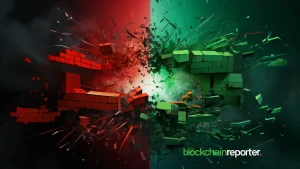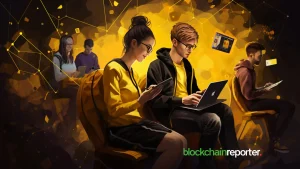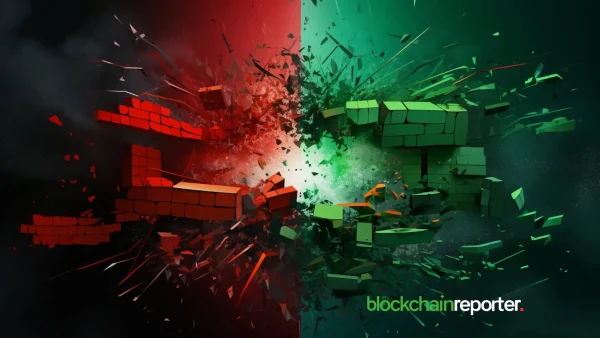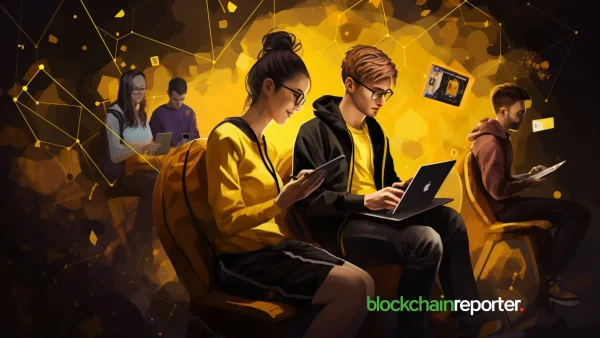
- 1. What are Soulbound tokens (SBTs)?
- 2. History of Soulbound tokens
- 3. Benefits of using Soulbound tokens
- 4. How do Soulbound tokens work?
- 5. Use cases of Soulbound tokens
- 6. How to recover your Soul if lost?
- 7. How can SBTs improve the present Web3 ecosystem?
- 8. Do any Soulbound tokens exist so far?
- 9. Soulbound token development services offered by LeewayHertz
- 10. Conclusion
SoulBound tokens are similar to Soulbound goods in World of Warcraft. These things are referred to as “Soulbound” due to the fact that they belong only to the players who acquire them and cannot be sold or traded to other players. This is exactly what prompted Vitalik Buterin, the architect of Ethereum, to consider, “What if NFTs were also Soulbound?”
This video game feature piqued Vitalik’s curiosity as a potential addition to the Web3 ecosystem and has proven to be rather fun to build. As a result of this, he and his other colleagues have come up with the idea of Soulbound tokens, which are digital identity tokens that may represent either an individual or an entity.
Continue reading this article to discover more about Soulbound tokens, their possible use cases in the world, and how they may strengthen the Web3 infrastructure to assist in the establishment of a decentralized society.
What are Soulbound tokens (SBTs)?
Soulbound tokens (SBTs) are digital identity tokens that are representing a person or entity’s qualities, features, abilities, and achievements. With its foundation in blockchain technology, it propels applications for NFTs to an entirely new level. If an NFT is minted with the purpose of serving as a Soulbound token, then it can never be moved away from your Soul. In this particular context, the Soul is a metaphor for your own money.
The goal of SBTs is to transform the idea of NFTs into something that extends beyond monetary value and bragging rights, namely a token that is both unique and incapable of being traded. Therefore, Soulbound tokens are NFTs that are not transferable and represent your identity. They are connected to a blockchain network and store the one-of-a-kind identifying details of an individual or entity.
How can individuals and entities utilize SBTs?
People have the potential to possess numerous souls, each of which reflects a unique combination of characteristics, experiences, and accomplishments from their lives. A person may, for instance, have what is referred to as an “education Soul” for their prior educational experiences, a “medical Soul” for their past medical histories, or a “credential Soul” for their previous professional experiences.
When it comes to entities, Souls can stand in for entities when they are allotting SBTs. SBTs that are owned by one Soul in this situation can be attested or issued by other Souls, who serve as counterparties to this ownership connection. These counterpart Souls may take the form of individuals, businesses, or even other organizations. Employees who are in possession of their own Souls can be issued SBTs by companies, which symbolize their job experience. Companies can also be considered Souls.
History of Soulbound tokens
In a January 2022 blog post, Ethereum co-founder Vitalik Buterin introduced the concept of Soulbound tokens for the first time. In the blog, he detailed powerful “Soulbound” artifacts from the popular fantasy game World of Warcraft that cannot be sold or traded with other players. According to him, NFTs in their current form share many characteristics with rare and epic items in massively multiplayer online games.
Later, in May 2022, Buterin and his colleagues E. Glen Weyl, an economist and social technologist, and Puja Ohlhaver, a lawyer, built on the concept in a paper titled “Decentralized Society: Finding Web3’s spirit.” Soulbound tokens are digital non-transferable tokens designed for social identity in a decentralized society, according to the paper.
Benefits of using Soulbound tokens
Soulbound tokens are extremely useful for digital verification and documentation. As SBTs are tied to their Souls, they cannot be counterfeited, ensuring the legitimacy of the document. They can also aid in the selection of the most qualified candidate for a post.
Moreover, SBTs permit the establishment of more dependable connections in dispersed power structures. SBTs can also be used to verify one’s identity in order to access particular Metaverse projects. In the meanwhile, implementing SBTs can drastically enhance voting procedures in DAOs. Additionally, SBTs permit decentralized lending networks to provide unsecured loans.
How do Soulbound tokens work?
Although there are no specific Soulbound token standards as of yet, the whitepaper produced by Vitalik and his associates outlines the fundamental operation of SBT. Non-transferability is a fundamental and distinctive characteristic of SBTs. Unlike existing NFTs and token standards such as the fungible ERC-20 or the non-fungible ERC-721, Soulbound tokens are not designed to have a market value and hence cannot be sold or transferred to another wallet.
Specifically, because they are connected to the Souls. So, what are “Souls” exactly? SBTs are issued by and stored in Soul-based accounts. Due to the fact that Souls possess SBTs, they are used to establish provenance and repute. As previously stated, Souls may symbolize individuals, groups, businesses, and other entities. Notably, Souls are not anticipated to have a 1:1 depiction of humans, which means that in a decentralized society (DeSoc), one individual can have numerous Souls.
Use cases of Soulbound tokens
Even though the idea of SBTs has only been conceptualized up until this point, and the development of Soulbound tokens is only in its infancy, it already has potential applications in a variety of different fields. Let’s investigate some of the ways in which it can be used in everyday life.
Education history
The release of a person’s educational history is one of the most important use cases for Soulbound tokens. When a student graduates from a traditional learning system, educational institutions provide a certificate attesting to the completion of their courses.
In the context of decentralized identification, the educational institution issuing SBTs to its students may be a Soul, and the students themselves would be Souls. The SBT would hold a student’s credentials and data, confirming their essential credentials and proving university participation.
Job applications
Similar to their application in the education sector, SBTs can be used to store employment history and professional certifications. In the form of SBTs, companies can provide their employees’ work experience, projects completed, details of their accomplishments, and other data and information.
Health records
Medical records can be stored on Soulbound tokens in the healthcare industry. Employing SBT for health records and data helps expedite the process of transferring doctors or healthcare organizations. Theoretically, SBTs can eliminate the time-consuming tasks of completing paperwork, authenticating your medical history, and approaching many people.
NFT trading
SBTs are able to eliminate fraudulent individuals who deceive users into purchasing NFT collections. Authentic NFT artists are able to link SBT to their NFT collection and Soul. Collectors of NFTs will subsequently be able to evaluate the SBT of their collections in comparison to the artist’s Soul. If the SBT matches, purchasers can acquire the NFT; otherwise, the NFT can be proven to be fraudulent. As such, SBTs validate the legitimacy of an NFT collection.
Governance
DeFi protocols provide early adopters with airdrop tokens in exchange for their confidence and support of the project. These tokens represent the right to vote. Those who are willing to pay a high price for governance rights frequently stand to gain immediately by impacting the vote. Giving non-transferable Soulbound tokens to early adopters virtually guarantees that the protocol’s control remains in the hands of those who care most about it.
How to recover your Soul if lost?
One of the drawbacks of Soulbound tokens is the possibility of losing your Soul. Vitalik Buterin has nonetheless provided a recovery solution. Community recovery, which is comparable to social recovery, is facilitated by SBTs.
SBTs represent a user’s memberships in various communities, some of which may be off-chain, such as club membership, and others on-chain, such as involvement in a DAO or protocol governance. Recovery of a Soul’s private keys would require the approval of a qualified majority of the Soul’s communities under a community recovery paradigm.
How can SBTs improve the present Web3 ecosystem?
Trust is a big obstacle for the Web3 sector. Similar to typical bank credit ratings, Soulbound tokens might keep track of customers’ DeFi borrowing history and other risk-determining indicators. SBTs are an additional alternative that has been submitted to vote in decentralized autonomous organizations (DAOs).
Unlike the current governance model, which is dependent on the number of tokens a member holds, DAOs might issue SBTs that transfer voting power based on members’ interaction with the community. This approach would grant the highest reputation and the greatest voting power to the most loyal users.
Do any Soulbound tokens exist so far?
SBTs remain in the conceptual phase as of August 2022. Nevertheless, co-author of the main SBT whitepaper Glen Weyl expects that initial SBT use cases will emerge by the conclusion of 2022. Binance has taken the lead in SBT deployment by launching its own SBT, Binance Account Bound (BAB), on the BNB Chain on September 8, 2022. BAB attempts to overcome challenges with identity verification on Web3 by providing a digital verification solution for Binance customers who have undergone KYC. It cannot be transferred and has no financial value.
Soulbound token development services offered by LeewayHertz
LeewayHertz is a recognized software development organization with more than fifteen years of experience in software, blockchain, and Web3 development. Their programmers have extensive knowledge and proficiency in a variety of Web3 development services, such as token development services.
LeewayHertz provides an extensive array of Soulbound token creation services, such as Soulbound token development, Soulbound token development consultation, and Soul-backed DAO development.
Conclusion
Soulbound tokens are something that Vitalik Buterin sees as a foundational component of a decentralized society. SBTs are proving to be useful in the process of constructing a DeSoc since they establish digital identities and provenance. Even though the idea of a decentralized society can appear to have no real-world implications, it is nonetheless important to take it into consideration. The emergence of SBTs, with their numerous applications in Web3, DeFi, and even in day-to-day life, is a new phenomenon that has the potential to transform the Web3 ecosystem.
READ MORE:
NFT for Dummies: Your No-Nonsense Guide to the NFT Present & Past
RhinoX Soulbound NFT Launches Roadmap Detailing New ‘Soul Breeding’ Mechanism on Web3
Frequently Asked Questions
What are Soulbound tokens (SBTs)?
SBTs are non-transferable digital identity tokens that represent a person or entity’s traits, experiences, skills, or affiliations. They are stored in "Souls" (wallets) and cannot be traded or sold.
How do Soulbound tokens work?
SBTs are issued and stored in Soul-based accounts. Each Soul can contain multiple SBTs tied to specific life events or credentials. Their non-transferable nature ensures authenticity and personal ownership.
What are the use cases of SBTs?
SBTs can represent academic degrees, job experience, medical history, verified NFT authorship, DAO voting rights, and more. They offer a decentralized, verifiable way to store and share personal data.
Can you recover a lost Soul?
Yes, Vitalik Buterin proposed a community recovery model where a majority of trusted Souls (e.g., communities or DAOs) can help recover a Soul’s private key if access is lost.
Do Soulbound tokens exist today?
Yes, Binance launched the first live example called Binance Account Bound (BAB) in 2022. It's a non-transferable token for identity verification on the BNB Chain, marking the beginning of SBT adoption.









